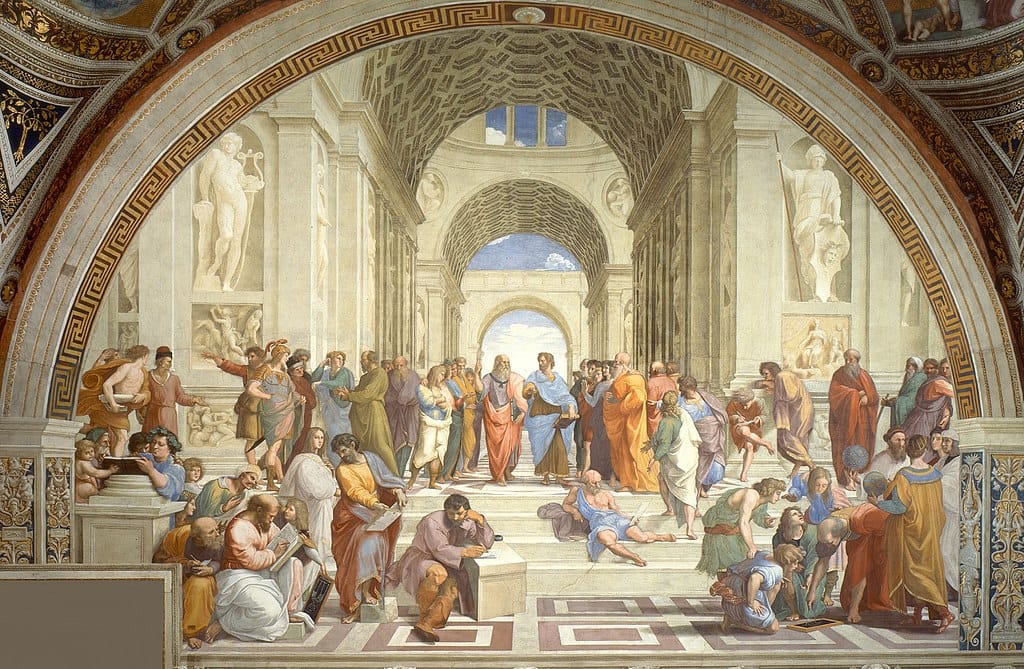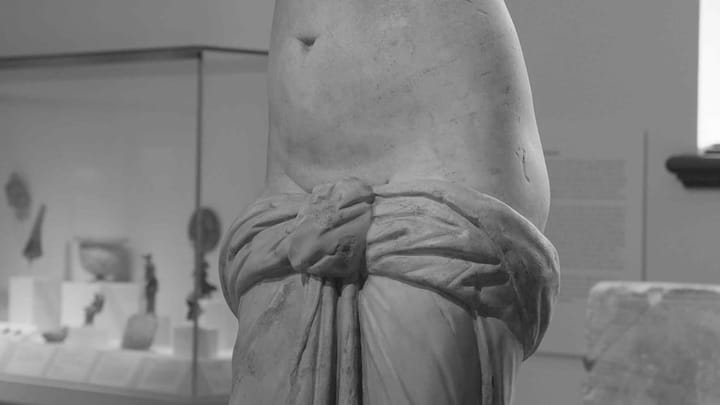The passion and pursuit of classical culture have continued for centuries. The practice of appreciation of ancient art, such as Greek sculpture, is a prevalent derivative of the admiration of classical culture, which has continued throughout history, evolving and adapting to different cultures and contexts. Rome, for example, was fascinated by Greek sculptures. The enormous Roman copy of Greek sculpture in museums worldwide reflects Rome’s reverence for the beauty and sophistication of Greek sculpture.


left: Fragments of a marble statue of the Diadoumenos (Copy of Greek original bronze) right: Marble statue of Hermes (Copy of a Greek statue) Copy of work attributed to Polykleitos (Source. The Met)
Winckelmann, a German archaeologist in the 18th century, argues that contemporary artists should strive to imitate Greek art in order to improve his abilities in art and could profoundly change “his own essence and soul”(Winckelmann, 1755, 68). Classical culture became a pride for people related to them and a pride for human civilization throughout history.
Appropriate classical culture for legitimizing power, authority, and actions
The practices derived from the identification and esteem of classical culture are not limited to art. Various countries, especially in modern Europe, had sought to utilize or appropriate classical culture for legitimizing power, authority, and actions. By claiming a deep connection and relation with the ancient Greek and Rome civilizations and cultures, these countries powerfully justified their purpose, effectively achieved their goals, and amplified the consequence.
From the 18th century to the 20th century, Europe was characterized by a significant empire expansion, including Britain and France. While the expansion facilitated the spread of culture, trade, and technology, it simultaneously caused exploitation and social inequality in colonized areas. The expansion of empires was driven by the desire for empires to strengthen and gain benefits for themselves. Therefore, the appropriation of classic culture became a method to legitimize their actions, rule, and promote their own superiority.
Rediscovery of Baalbek - British Empire

The rediscovery of Baalbek during the 19th century becomes “a metaphor for Empire”(Makdisi, 2011, 257). Many European explorers and archaeologists were fascinated by Baalbek’s ruined architecture. Their passion was merely academic but invoked by a desire to claim connections to the classical past history of Baalbek. As the heritage and descendants of Baalbek’s past culture, empires subsequently legitimized their invasion and imperialist objectives of Baalbek. The British Empire in the 19th century appropriated classical culture in a similar way to legitimize their power and superiority. In “Classics and Imperialism in the British Empire”, Mantena elaborates that the British Empire bounded themselves with the ancient Rome Empire “for aiding nationalistic projects as well as imperial ambitions in Britain”(Mantena, 2010, 59). The imperial practice of ancient Rome was a “model worthy of emulation”(Mantena, 2010, 58) for the British which could be “reinforcement of a unique British nationality”(Mantena, 2010, 58). Hence, by asserting a deep connection with ancient Rome, the British legitimize their colony and expansion as an action to emulate the achievements of the ancient empires.
Racial ideology - Nazi Germany
Despite justifying rules and maintaining control over colonies, another most influential appropriation of classical culture was racially motivated. Nazi Germany intentionally created connections between their race to ancient Greeks and Romans to legitimize superior national identity and policies of racial superiority and exclusion. Nazi Germany tried to rebuild its national identity in the 19th century, driven by the desire to unify into a single nation-state. Compared to significant changes in other European countries, Germany saw itself as “a verspätete Nation”(Chapoutot, 2016, 18). In the process of rebuilding national identity, “a dearth of political, linguistic, or religious”(Chapoutot, 2016, 19) forced Germany to turn its attention to race. In the 20th century, Nazi German believed that they were associated with an Aryan race and was superior to all other races since all historical great civilization across Europe was “the fruit”(Chapoutot, 2016, 34) of Aryan, especially “the glorious and immortal achievements of Greece and Rome”(Chapoutot, 2016, 34). By connecting to the great achievement of classical culture, “the Greeks are our closest racial brethren”(Chapoutot, 2016, 38), Nazi Germany built its supremacy national identity which lead to reinforcing their exclusionary and destructive policies on other races and promoting their vision of a racially pure society. The Nazi regime invoked the legacy of the classical world, creating a sense of historical continuity that justified its actions and bolstered its claim to power.
One could conclude that the appropriation of classical culture can be derived from various desires and legitimize different purposes, including power, authority, and actions. Nevertheless, why does the appropriation of classical culture legitimize these practices? The shared ideology behind these practices is a deeply shared belief in superiority in classical culture.
Philosophical underpinnings of western cultural identity
The philosophical underpinnings of this ideology can be traced back to Aristotle's Politics (VII.7). Aristotle explicitly indicates the superiority of Greece by comparing themselves to people in the north of Europe and Asiatics. People in the north of Europe had courage but lacked “understanding and the art”(Aristotle, 338), and Asiatics were sensible but were “deficient in courage”. Greece had these two qualities, “courage and sensible”(Aristotle, 338), at the same time. Thus, Greece could have the best system of government and was “capable of commanding the whole world”(Aristotle, 338). The statement from Aristotle is just the epitome of the sense of superiority in classical culture. The superiority of classical culture was widely expanded with the rising of the Rome Empire. Furthermore, the lasting and significant historical influences of philosophy, literature, and art of ancient Greek and Rome also have a great contribution to the ideology. The philosophies of ancient Greek and Roman thinkers, such as Plato and Aristotle, profoundly shaped the Western intellectual. Highet states that “our modern world is in many ways a continuation of the world of Greece and Rome”(Highet, 2015, 1). Renaissance, for example, is a typical consequence that proves that people value the culture of Greek and Rome as treasures, and “one of the treasures that most enrich us then was classical art and literature”(Highet, 2015, 81). The artistic, architectural, and literary accomplishments revered for their beauty, sophistication, and innovation eventually contributed to the perception that countries connected to classical culture are superior due to their historical cultural achievements.
The historical, cultural, and intellectual achievements of ancient Greek and Rome both in some ways engraved a deep belief and identification in people on the superiority of cultures. Thus, by connecting to ancient civilizations and appropriation of classical culture, countries intentionally borrow the superiority of classical culture as a efficient tool to accomplish and legitimize their power, authority, and actions.
Reference:
Mantena, Rama Sundari. 2010. “Imperial Ideology and the Uses of Rome in Discourses on Britain's Indian Empire.” In Classics and Imperialism in the British Empire. 54-73.
Makdisi, Usama. 2011. “The ‘Rediscovery’ of Baalbek: A Metaphor for Empire in the Nineteenth Century.” In Scramble for the Past: A Story of Archaeology in the Ottoman Empire, 1753-1914. 257-279.
J. J. Winckelmann. 1755. “On the Imitation of the Painting and Sculpture of the Greeks.” 61-68. Chapoutot, Johann. 2016. “Annexing Antiquity.” In Greeks, Romans, Germans: How the Nazis usurped Europe's classical past. 15-24, 33-35, 37-40, 51-69, 73-82
Highet, Gilbert. 2015. The Classical Tradition: Greek and Roman Influences on Western Literature. New York: Oxford University Press,



Comments ()